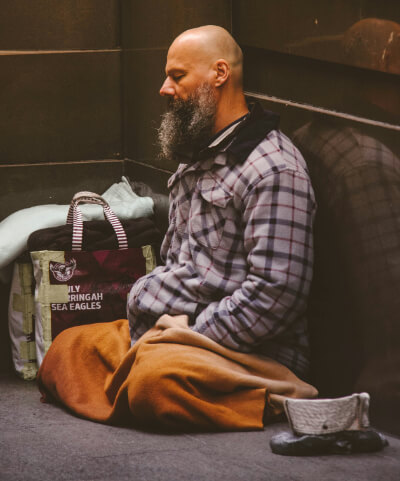Oxfordshire Homeless Movement
Mindfulness Project Goes From Strength to Strength
Oxford, 14th June, 2024
While many people today recognise the benefits of mindfulness, the challenge lies in developing a 'formal practice' for long-term wellbeing.
Scientific research into the practice of mindfulness has found it brings many important health improvements. Immune function, pain relief, blood pressure, sleep, memory, attention, empathy, learning, and reduced inflammation are areas where improvement often takes place. This is big business. In 2020, nearly 2,500 scientific papers on mindfulness and meditation were published1.
While it seems counter-intuitive that a traumatised mind would find more ways to source fresh harm, a downward spiral—in life as in mind—is very often inevitable. Maladapted coping strategies emerge. This is thought to be because trauma severely suppresses higher functions such as planning, social skills and receptivity. Our reaction to stress cuts off our healthy selves; and this is true for everyone.
 The global mindfulness movement began in stress reduction—MBSR. Mindfulness restores the missing clarity. It helps people unstick from these inevitable patterns without any explicit encouragement to dive deep into root causes. Instead it shifts the focus to elsewhere2.
The global mindfulness movement began in stress reduction—MBSR. Mindfulness restores the missing clarity. It helps people unstick from these inevitable patterns without any explicit encouragement to dive deep into root causes. Instead it shifts the focus to elsewhere2.
Interest in the UK in how mindfulness may help the homeless population has already been sparked3. Could it be of highest benefit to those among the most affected by trauma in our society? With the roots of mindfulness being what they are—stress reduction—the logic would seem to suggest so.
However, existing 8-week courses don't fit outreach needs, and the stress-based resistance to receptivity poses adoption barriers. In some settings—like MBCT—small, micro-level activities are being used. These can have very useful client 'wins' during intervention programs. But according to the experts, like Jon Kabat-Zinn, long-term change has always required ongoing commitment. Science keeps finding new benefits. Without what's called a "formal practice" some such benefits may always be out of reach. Can mindfulness transform lives for greater wellbeing in ways as-yet untapped in the homeless sector? One group thinks "formal practice" is a big missing key.
A pilot project begun in the Westgate Library in 2022, now known as Mindful Refuge, is volunteer led and has reached more than 10 individuals affected by the homelessness issue. 5 of these have attended a regular group; in one case for almost 2 years. The project encourages formal mindfulness practice—sitting meditation. Informed by its 2 years of experience, the project now promotes tailored meditation 'gym reps'. Participants go at their own speed with the ultimate aim of taking up sitting meditation for wellbeing on a regular basis.
Supporting this are four free resources:
- weekly group sessions: free of charge, now hosted at a quiet venue near The Gatehouse, thanks to generous support
- free website log-in: offering guided meditations based on a course accredited by the IMTA4; amended to suit the context, with onward tailored support
- an online guide: unique, expert and detailed steering on how to meditate
- free cushions: for formerly homeless individuals now housed, so people can practice at home
The project emphasises that homelessness is (also) a wellbeing issue, and mindfulness is crucial for the long-term wellbeing of everyone together. The group hopes for a future where mindfulness meditation—the formal practice aspect—is a priority survival skill passed on in the homeless sector, locally and beyond.
 For more information, eligibility, and an A4 poster, visit the group website or email to meditate.oxford@pm.me.
For more information, eligibility, and an A4 poster, visit the group website or email to meditate.oxford@pm.me.
The project collaborates with The Prison Phoenix Trust and supports LEAF. While it has a secular approach, it also supports those on a spiritual journey. The lead facilitator, Trevor, is qualified as a student teacher of IMTA-accredited Meditation and Mindfulness material and is a senior lay Buddhist. A bursary place was awarded to him by London-based charity Zenways, specifically to enable his homeless sector work. His project support team include a health professional and sector manager.
For the log-in link, email the group.
See the project website
Footnotes
- https://www.ncbi.nlm.nih.gov/
pmc/articles/PMC8282773 - https://mindfulrefuge.org/health-benefits
- source: Homeless Link Podcast "Season 2 Episode 2: Mindfulness & Stress"
- International Mindfulness Teachers Association
Photo by Dean Bennett on Unsplash.


